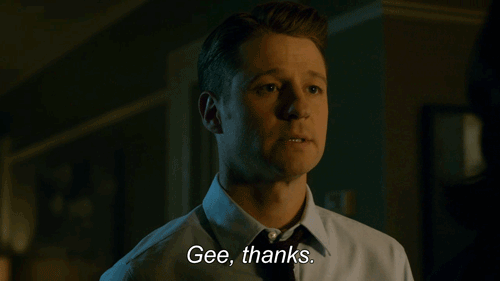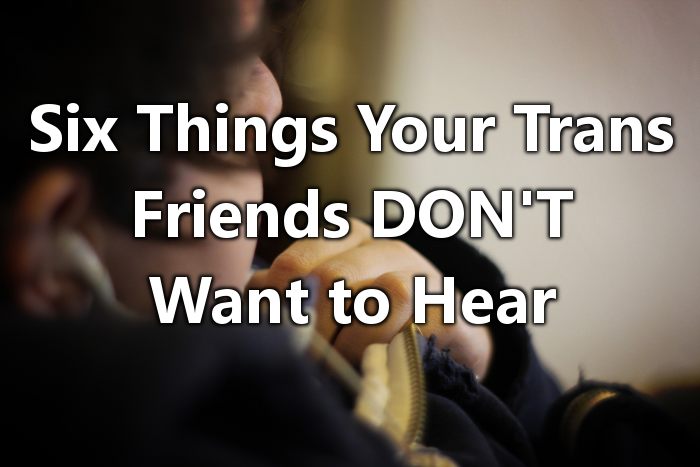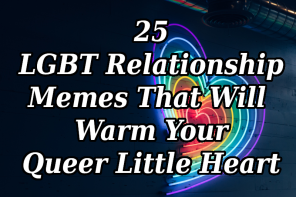Is it just me or do trans people seem to be everywhere right now?
Transgender people used to be hidden away, forced to contort themselves into roles that felt alien just to survive. Today, we’ve seen transgender celebrities, models and even politicians standing up and demanding the respect they rightfully deserve. Still, it’s a new concept for many and even if your BFF comes out as trans, you may find yourself unsure of how best to support them or even what to say.
That’s why we’ve made this list of five things your trans friends definitely DON’T want to hear.

1. You Can Totally Pass As a Woman / Man
This is probably the most common and, to be fair, it’s usually said with the best of intentions. Transgender people may want affirmation from friends and family on their look – especially if they are still finding their personal style. Still, telling someone “you can pass” is seen as a bit of a put down. It implies they’re putting on an act or even “playing dress up”.
What You Can Say Instead: Don’t focus on the gender they identify with – just focus on how they look. A simple ‘You look amazing’, ‘That skirt / shirt / suit flatters you so much’ or ‘You look great’ will do. No need to point out their gender.
2. What’s Your Real Name?
I have to admit, I’m guilty of asking this one. I have been lucky enough, however, to have asked it of trans men and women who dealt with my nosy question with patience and grace. Sure you may wonder if the Nick you’re meeting was once Nicole but, honestly, does that matter? The name someone was given at birth isn’t necessarily their ‘Real Name’. People change their names for a million different reasons. In fact, they’ve been doing it for literally generations. Women have been changing their last names since marriage was instituted and there are plenty of other reasons people change their names. Prying into the personal history of someone isn’t the best way to forge a new friendship.
What You Can Say Instead: Nothing. Their name before doesn’t matter. Just accept them for who they are and use the name they have given you.
3. Sorry, I’m Just So Used to Your Old Name.
The flip side of the ‘What was your name before’ is when close friends and family claim to have a hard time adapting to a ‘New Name’ or pronouns. I get it – I really do. I have been close to people during their transition and have had to change names and pronouns and, yeah, it can be a challenge. But we’re talking about someone you care about so make an effort.
What You Can Say Instead: Obviously, you should make every effort to use the name and pronouns someone asks. Having said that, mistakes happen – especially if you’ve been close for awhile and you genuinely are simply accustomed to calling them by their old name. If you do make a mistake in name or pronoun, simply apologize and correct yourself – no need to turn it into a lengthy monologue about how their transformation is affecting you. If you find you are genuinely having a hard time adopting their new name, maybe it’s time to examine your own sense of loss. After all, when a close friend transitions, it’s normal to feel a bit out of sorts and confused. But that’s not a reason to deny them respect. Get used to their name change and deal with your issues in your own time.
4. Are You Done Transitioning? (AKA Are You Planning Top / Bottom Surgery?)
When people ask this question, they are essentially asking what kind of genitals another person has. Just let that sink in for a minute. Would you ask any other person that question? I’m guessing no. So don’t ask it of your trans friends or trans people you meet.
What You Can Say Instead: This is another case where it’s best to just say nothing. It doesn’t matter if someone is choosing to go through with top or bottom surgery. You don’t need to know what their genitals look like or how they function to be a friend. So just don’t worry about it.
5. Which Bathroom Do You Use?
Do I even need to explain why this is an awful question? People just want to pee.
What You Can Say Instead: Literally anything.
6. So Does This Mean You’re Gay / Straight / Bi Now?
Sometimes when someone transitions it can bring their sexual orientation into question. For example, a man who is married to a woman but finally decides he is ready to come out as transgender may want to stay married to his wife. If he transitions, does that make him a lesbian? What does it make his wife? The answer is the same for both.
None of your business.
If you are very close to someone who is transitioning you may be tempted to ask what this means for their sex life. Keep in mind, however, they may be struggling with this exact question. So give them some room and let them sort it out in their own time, without being under a microscope.
What You Can Say Instead: For a close friend you might ask what that means for their current relationship since close friends often do discuss the more intimate details of their love lives. But, honestly, unless you are very close to the person it really isn’t something you should question. Regardless of how close you are or how much you’ve had conversations about it in the past, if they become visibly or vocally uncomfortable just drop it. A person’s sexual orientation and their sex life are deeply intimate topics and not really fascinating fodder for the public.
At the end of the day, a transgender person is no different than anyone else. They want to be comfortable in their skin, they want to celebrate their style and they just want to get on with their life. If you really want to be an ally to your trans friends or even the trans community in general, use whatever position or privilege you have to advocate on their behalf. That means doing any of the following:
- Use their preferred pronouns and name
- Challenge transphobic jokes or comments as they happen
- Don’t use words designed to marginalize (That means dropping the word ‘tranny’ from your vocab. Yeah, it’s hard to change speech patterns but buck up, buttercup, language changes over time)
- Respect their privacy by not telling others about their gender history
- Don’t put them on a pedestal. Many trans people get uncomfortable when people say ‘You’re so brave’ or make them into a role model. Just let them be who they are and don’t objectify or idolize them simply for following their heart.
Being an ally to transgender people comes down to one simple act – listening. Listen to your friends, watch documentaries, check out YouTube channels, read blogs and find other ways to connect with the trans community online and off. By simply stopping to listen and really hear what trans people are saying you’ll become an ally to the cause. By treating people – all people – with basic respect and an open mind you will be able not only to be an ally to transgender people but also just a good human being.
It’s a win-win.









